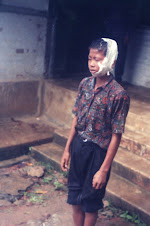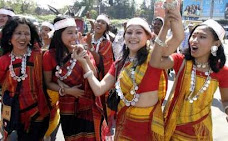Indigenous village attacked by land grabbers in Sirajganj
A group of land grabbers made an attack on the village of indigenous people to occupy a pond at Tarashe in Sirajganj. At least 20 indigenous villagers including 12 women were injured in this attack.
It is learnt that a dispute regarding ownership of a pond covering around 10 acres between Grameen Bank, a micro-credit-based NGO and one non-indigenous person named Lebu is under trial at the high court. 200 families of indigenous people have been living at the banks of this pond for generations. However, on that day, Mr. Lebu incited a group of miscreants to attack the indigenous village in order to evict indigenous villagers for occupying the pond and its adjacent banks. In this attack, at least 20 villagers including Jalo, Budhan Sing, Kanti, Saneka, Behula, Simita, Dipali, Sauda, Shakha Rani, Borni, Sakumar Sing, Shashti, Subhab, Basala, Gopal were wounded. It is also alleged that the miscreants also looted the valuables of the houses.
Please visit Bengali daily "Samakal" internet edition for details: http://www.shamokal.com/archive.details.php?nd=2008-09-16&nid=97776
Commercial afforestation by Destiny-2000 by occupying IP's land in Bandarban
Destiny-2000, a multi-level marketing company in Bangladesh, undertaked afforestation programme for commercial purposes in Bandarban district by purchasing lands that was leased out to non-residents of CHT. It is also alleged that Destiny also occupied private lands owned by indigenous Jumma villagers.
It is learnt that on 10 September 2008 local people droved out Destiny workers while they were cleaning land by setting fire with kerosene on existing forest and orchard owned by indigenous Jumma villagers at Chemi Dalupara area under Bandarban sadar upazila (sub-district). After driving out from there, they later tried to occupy the land owned by one Bengali permanent resident named A K M Jahangir. Following this incident, complain has been lodged with the headman court.
Khiyang Adivasi leader Mr. Bachha Khyang, Karbari of Chemi Dalu Para Mr. Achhomong and villager of Gungurumuk Para Mr. Chinghla Khiyang said that they opposed the workers of Destiny when they came to occupy their lands. A Bengali resident Mr. Jahangir also alleged that the workers of Destiny occupied and set fire a portion of his orchard. Contractor of Destiny who is involved in afforestation confessed ablaze of a portion of Jahangir's orchard.
It is worth mentioning that CHT Peace Accord signed in 1997 between the government of Bangladesh and indigenous people's political party PCJSS stipulates, "Out of the lands allotted to non-tribal and non-local persons for rubber and other plantations, the lease (allocation) in respect of the lands of those who did not undertake any project during the last ten years or did not properly utilize the lands shall be cancelled." It is also mentionable that al most all the leases were not utilized. However, though eleven have passed after signing of the Accord, no allotment (lease) has yet been cancelled.
Please visit Bengali daily "Prothom Alo" internet edition for details: http://www.prothom-alo.com/mcat.news.details.php?nid=MTE4MzIw&mid=Mg==
(d2kltd@bijoy.net)
Garos and Kotch Adivasis are threath of Eviction in Modhupur
Report by Abima Walki from Modhupur
The 25,000 Garo Adivasis are in eviction threath for the Nishorgo project of IRG in Modhupur Forest. The Convener of Adivasi Human Rights Association (AHRA) in the meeting of Association at Dhaka opined that the Nishorgo project at Modhupur Forest would evict the said number of Adivasis. The so-called National Park declaration of Modhupur in 1962 stopped the life, tradition and culture of Adivasis. The New project would do more harm to the Adivasis of Modhupur. The project intends to revive the National Park and evict the Adivasis, Mr. Ajoy A. Mree, Chairperson of Join Shahi Adivasi Parishad at Modhupur said. It is one of the inner agenda of Forest Department, he said. The Adivasis would not accept the so-called project as it would destroy the backbone of the locality.
The elderly leader Mr. Jerome Hagidok said that 'We do not know why this type of project Government is taking here. We demand the immediate cancellation of the project. We will resist the ill initiative. If any thing happens to the poor Adivasi and locality Government and IRG will be sole responsible."
The project intends to renovate the forest, one officer of IRG said, who is not willing to spell his name. Development Forest should not harm to the Adivasis, local political leader who is not willing to say his name said.
The project will cover about 21 thousand acres of land in the area. The main objective is to regain the National Park and Reserved Forest. The Adivasis are living in the area from immemorial of time. Some say they are living here from 1350s. The lands are used by the Garo and Kotch by getting leased from the Jamider of Natore. But in 1927 Forest Act forbids the Adivasis to use the land which were the crucial period for them. The eco-park project also one of the eviction project which was not successful due to local movement. In connection to this movement and land right activities, 11 Adivasis were brutally killed by the Forest Department. Only the intention to earn some money of IRG project, Adivasi leader Mr. Anthony Sangma said. Observer says, Government plans to evict the Adivasis and maid them more insecure. In this situation there is great demand to stop this type of anti-Adivasi project. Adivasi leaders also demanded to settle the land problem permanently in Modhupur area.
Focus on indigenous people's rights, Speakers urge media at roundtable
The Daily Star, 21 September 2008
Speakers at a roundtable yesterday said the media should focus on the rights of indigenous people rather than only portraying their livelihoods and cultural activities.
Journalists have to remain objective in reporting the ethnic issues and play a proactive role in bridging the gap between the media and ethnic communities for the betterment of the hill people, they said. Management and Resources Development Initiative (MRDI) organised the roundtable on "Bridging gap between media and ethnic communities" in Rangamati with the support from the Delegation of the European Commission to Bangladesh under the project "Bridging Media and Ethnicity", says a press release.
Speaking as the chief guest, UNO of Rangamati Sadar Prakash Kanti Chowdhury said journalists would have to approach to the proper persons at the government and non-governmental levels to collect the right information and then provide them to the nation. "It is the journalists who will identify the proper persons in order to collect the right information. Reporters of specific geographical areas need special facilities for their physical movement," he said and called on MRDI to take necessary initiatives in this regard.
Journalist Qurratul-Ain-Tahmina presented the keynote paper at the roundtable moderated by Shahana Huda, manager (Media & Communication) of Manusher Jonno Foundation. Hasibur Rahman, executive director of MRDI, stressed better understanding of human rights of the ethnic communities through a shared upbringing so that the media can cover appropriate and accurate news in time.
The discussants also stressed the need to portray the indigenous people in the media in a proper way and promoting their human rights through objective reporting. There are so many issues concerning their rights and the media should explore these issues, they said. They also sought greater cooperation from the media in addressing the genuine needs of the hill people through detailed and investigative reporting.
The journalists who were present at the roundtable said they need adequate and reliable sources of information for reporting the issues of ethnic communities. They also suggested that indigenous people should have greater representation in the media so that their issues can be properly highlighted in the media. Twenty-two community/NGO representatives, governmental officials and journalists took part in the roundtable.
skip to main |
skip to sidebar

Military enforcement

Survive

Torture

Raped & Killed Indigenous Jumma Women

Militarization in CHTs

Religious destruction

Land Grabbing

Indigenous Jumma Villeges burnt down

Atrocities


CHTs is a number one of Millitary Zone in the World.

With Traditional Dress
nandawansa

Military enforcement

Survive

Torture

Raped & Killed Indigenous Jumma Women

Militarization in CHTs

Religious destruction

Land Grabbing

Indigenous Jumma Villeges burnt down

Atrocities
Embassy in Los Angeles
About Bangladesh
Refugee in Homeland

News Papers
Audio & Video
Actrocities & Tortures

CHTs is a number one of Millitary Zone in the World.
Jumma Photo Albums
Jumma Links
Jumma Women

With Traditional Dress
Blog Archive
About Me
- IJPNUSA
- The Indigenous Jumma People Net in North America is for the movement of minority Jumma indigenous people in Chittagong Hill Tracts in Bangladesh. E-mail:jpnus@yahoo.com Webpage:-http://jummapeoplenet.blogspot.com/
